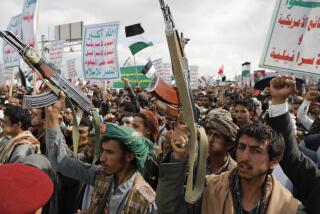Group lists 39 secret detainees
- Share via
WASHINGTON — A human rights group Tuesday published the names of 38 men and one woman it believes have been locked up in secret overseas facilities, and asked President Bush to disclose the identity and fate of all detainees the CIA has held since 2001.
Among those that Human Rights Watch suspects of being held by the CIA now or at one time is Khalid Zawahiri, an Egyptian allegedly picked up in the South Waziristan region of Pakistan in February 2004. Officials from the group say Zawahiri is probably the son and former associate of Ayman Zawahiri, said to be second in command of Al Qaeda.
Another on the list is Aafia Siddiqui, a woman who made the FBI’s Most Wanted list for her possible role in alleged Al Qaeda plots to launch attacks on U.S. soil.
The New York-based human rights organization included those and other names in a Monday letter to Bush that was made public Tuesday.
The group also released a report titled “Ghost Prisoner: Two Years in Secret CIA Detention,” which tells the story of another terrorism suspect, Marwan Jabour, a Palestinian man who claims he was tortured and held incommunicado for more than two years by the United States and Pakistan.
Human Rights Watch officials said the letter and the report were part of an effort to pry loose more information about detainees who have been held by the CIA or other U.S. authorities.
The White House and CIA had not acknowledged that the detainee program existed until September, when Bush announced that Khalid Shaikh Mohammed, the suspected architect of the Sept. 11 terrorist attacks, and 13 others had been held by the CIA and were being transferred to military custody at Guantanamo Bay, Cuba.
The Defense Department is preparing to try those men, including some accused of being Al Qaeda’s most dangerous operatives, in some form of hybrid military-criminal justice proceeding.
Joanne Mariner, director of Human Rights Watch’s Terrorism and Counterterrorism Program, said in her letter to Bush that the organization understood the need to detain and incarcerate suspected terrorists. But she also said the United States was breaking the law by holding them in custody without announcing it and by not giving them a way to contest their incarceration.
“If such persons are indeed implicated in terrorist crimes, they should be charged and prosecuted, not subject to enforced disappearance,” Mariner wrote.
The White House referred calls for comment to the CIA, which said it abides by the rule of law when detaining, transferring and interrogating terrorism suspects.
“The agency’s terrorist interrogation program has been conducted lawfully, with great care and close review, producing vital information that has helped disrupt plots and save lives,” said CIA spokesman Paul Gimigliano. He also said the CIA and U.S. government did not “conduct or condone torture” or transfer suspects to countries that do engage in torture.
Human Rights Watch listed 16 individuals it said were probably detained in CIA facilities and an additional 22 who it said “may have been once held in secret CIA prisons.”
The group said it compiled the list by conducting interviews with former detainees, local authorities, defense lawyers and family members and by scouring local news agencies in Pakistan, Saudi Arabia and other countries where the suspects allegedly were captured.
“In many cases, the local authorities bragged about it,” said John Sifton, a senior researcher at Human Rights Watch.
The group acknowledged that some of the names have been disclosed previously but said it was necessary to include them because U.S. officials have refused to confirm their status or whereabouts.
Bush announced the arrest in Iraq of Hassan Ghul in comments to the media on Jan. 26, 2004. He said that Ghul reported directly to Shaikh Mohammed and that he was “helping Al Qaeda to put pressure on our troops.”
Another suspected Al Qaeda operative on the list, Mustafa Setmariam Nasar, is wanted by Spain, and his 2005 arrest in Pakistan has been well publicized.
But many of the other names have never been disclosed, including Jabour’s.
Jabour was arrested by authorities in Lahore, Pakistan, in May 2004, then held for a month at a secret detention facility operated by the U.S. and Pakistan, the report says.
He was flown to a CIA secret prison, most likely in Afghanistan, before he was flown to Jordan last summer, transferred to Israel and eventually released in the Gaza Strip, where he has family.
Mariner said Jabour gave her the names of at least nine previously undisclosed terrorism suspects he had seen at detention facilities.
U.S. counter-terrorism officials would not confirm Jabour’s account but said they consider him to be a dangerous Al Qaeda operative.
“This guy has a history. He trained in Afghanistan and fought with the Taliban before working with Al Qaeda,” said a U.S. counter-terrorism official who spoke on condition of anonymity because he was not authorized to comment on the matter. “He was in touch with top Al Qaeda operational figures ... and was strongly linked to Al Qaeda chemical and biological efforts and had provided some funding for an Al Qaeda” biological weapons lab.
The Human Rights Watch report says Jabour acknowledges some ties to Islamic militants, including training at a camp in Afghanistan and helping others escape to Pakistan in 2003, but he denied any ties to terrorism.
*
More to Read
Sign up for Essential California
The most important California stories and recommendations in your inbox every morning.
You may occasionally receive promotional content from the Los Angeles Times.










